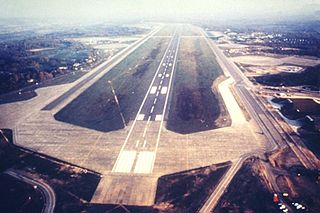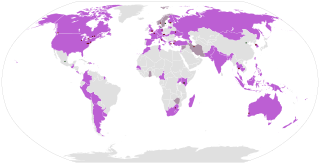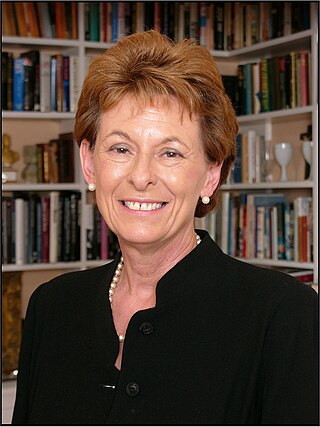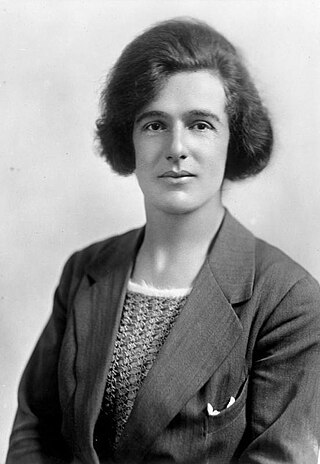Related Research Articles

Virginia Hilda Brunette Maxwell Bottomley, Baroness Bottomley of Nettlestone, is a British Conservative Party politician and headhunter. She was a Member of Parliament (MP) in the House of Commons from 1984 to 2005. She became a member of the House of Lords in 2005.

Royal Air Force Greenham Common or more simply RAF Greenham Common is a former Royal Air Force station in the civil parishes of Greenham and Thatcham in the English county of Berkshire. The airfield was southeast of Newbury, about 55 miles (89 km) west of London.

Peace camps are a form of physical protest camp that is focused on anti-war and anti-nuclear activity. They are set up outside military bases by members of the peace movement who oppose either the existence of the military bases themselves, the armaments held there, or the politics of those who control the bases. They began in the 1920s and became prominent in 1982 due to the worldwide publicity generated by the Greenham Common Women's Peace Camp. They were particularly a phenomenon of the United Kingdom in the 1980s where they were associated with sentiment against American imperialism but Peace Camps have existed at other times and places since the 1920s.

The International Council of Women (ICW) is a women's organization working across national boundaries for the common cause of advocating human rights for women. In March and April 1888, women leaders came together in Washington D.C., with 80 speakers and 49 delegates representing 53 women's organizations from 9 countries: Canada, the United States, Ireland, India, United Kingdom, Finland, Denmark, France and Norway. Women from professional organizations, trade unions, arts groups and benevolent societies participate. National councils are affiliated to the ICW and thus make themselves heard at the international level. The ICW enjoys consultative status with the United Nations and its Permanent Representatives to ECOSOC, ILO, FAO, WHO, UNDP, UNEP, UNESCO, UNICEF, UNCTAD, and UNIDO.

Women Strike for Peace was a women's peace activist group in the United States. Nearing the height of the Cold War in 1961, about 50,000 women marched in 60 cities around the United States to demonstrate against the testing of nuclear weapons. It was the largest national women's peace protest during the 20th century. Another group action was led by Dagmar Wilson, with about 1,500 women gathering at the foot of the Washington Monument while President John F. Kennedy watched from the White House. The protest helped push the United States and the Soviet Union into signing a nuclear test-ban treaty two years later. Reflecting the era in which the group's leaders had been raised, between the First-wave feminism and the Second-wave feminism movements, their actions and pleas leaned towards female self-sacrifice rather than towards their own self-interests. However, they pushed the power of a concerned mother to the forefront of American politics, transforming the mother from a "passive victim of war to active fighter for peace".

Lady Helen Olga Hay, usually known as Lady Olga Maitland, is a British Conservative politician and journalist, formerly member of parliament for Sutton and Cheam.

Greenham Common Women's Peace Camp was a series of protest camps established to protest against nuclear weapons being placed at RAF Greenham Common in Berkshire, England. The camp began on 5 September 1981 after a Welsh group, Women for Life on Earth, arrived at Greenham to protest against the decision of the British government to allow cruise missiles to be stored there. After realising that the march alone was not going to get them the attention that they needed to have the missiles removed, women began to stay at Greenham to continue their protest. The first blockade of the base occurred in March 1982 with 250 women protesting, during which 34 arrests occurred.
The League against Imperialism and Colonial Oppression was a transnational anti-imperialist organization in the interwar period. It has been referenced as in many texts as World Anti-Imperialist League or simply and confusingly under the misnomer Anti-Imperialist League.

Thomas Trenchard, 2nd Viscount Trenchard, MC, was a British hereditary peer and junior minister in Margaret Thatcher's Conservative government from 1979 to 1983.

The anti-nuclear movement in the United Kingdom consists of groups who oppose nuclear technologies such as nuclear power and nuclear weapons. Many different groups and individuals have been involved in anti-nuclear demonstrations and protests over the years.

Jill Liddington is a British writer and academic who specialises in women's history.
Helen John was one of the first full-time members of the Greenham Common peace camp in England, UK, and was an peace activist for over 30 years.

Jessie Stephen, MBE was a twentieth-century British suffragette, labour activist and local councillor. She grew up in Scotland and won a scholarship to train as a teacher. Family finances dictated otherwise, leading to her becoming a domestic worker at the age of 15. She became involved in national labour issues as a teenager, via organisations such as the Independent Labour Party and the Women's Social and Political Union. Stephen moved to London during World War I and in the 1920s she toured the United States and Canada, where she held meetings with the public including migrant English domestic workers.
The World Committee Against War and Fascism was an international organization sponsored by the Communist International, that was active in the struggle against Fascism in the 1930s. During this period Adolf Hitler came to power in Germany, Italy invaded Ethiopia and the Spanish Civil War broke out. Although some of the women involved were Communists whose priority was preventing attacks on the Soviet Union, many prominent pacifists with different ideologies were members or supporters of the committee. The World Committee sponsored subcommittees for Women and Students, and national committees in countries that included Spain, Britain, Mexico and Argentina. The Women's branches were particularly active and included feminist leaders such as Gabrielle Duchêne of France, Sylvia Pankhurst of Britain and Dolores Ibárruri of Spain.

Priscilla Hannah Peckover was an English Quaker, pacifist and linguist from a prosperous banking family. After helping to raise the three daughters of her widowed brother, in her forties she became involved in the pacifist movement.

The Campaign for Nuclear Disarmament (CND) is an organisation that advocates unilateral nuclear disarmament by the United Kingdom, international nuclear disarmament and tighter international arms regulation through agreements such as the Nuclear Non-Proliferation Treaty. It opposes military action that may result in the use of nuclear, chemical or biological weapons, and the building of nuclear power stations in the UK.

Lucy Thoumaian or Rossier de Visme was an Armenian woman's rights and peace activist. Driven out of Armenia she helped create a school in Chigwell for orphaned Armenians. She published a manifesto for peace before she attended the Women at the Hague conference in 1915. Afterwards, she began working for the League of Nations.
Harriette Mary Beanland was a British textile worker and suffragette who was secretary to the Women's Labour League branch in Nelson in Lancashire.
Olga L. Medvedkov is a Russian-American geography professor and peace activist. In 1982, Medvedkov and her husband Yuri were among the founders of the Group to Establish Trust between the USSR and the USA. The organization hoped to develop peaceful dialog between the superpowers during the Cold War. As it was independent from the official Soviet World Peace Council, group members were seen as dissidents and frequently followed and arrested by the police and the KGB. Despite Soviet suspicions of the Trust-Builders, the group gained support from Western anti-war activists. In the 1980s, various groups from Europe, Canada, and the US had their members meet with Medvedkov and her husband. She was arrested in 1983 and charged with assaulting an officer. International pressure and media campaigns called for her release. Although she was convicted, Medvedkov's sentence was suspended. She, her husband, and her children and parents were granted visas to emigrate in 1986. Relocating to Ohio, she became a professor of geography and director of the Russian studies program at Wittenberg University in Springfield, Ohio.
References
- ↑ Eldridge, John (1995). The Glasgow Media Group Reader, Vol. I: News Content, Language and Visuals. Routledge. p. 332. ISBN 978-1-136-16499-6.
- ↑ Liddington, Jill (1991). The Road to Greenham Common: Feminism and Anti-militarism in Britain Since 1820. Syracuse University Press. p. 254. ISBN 978-0-8156-2539-1.
- ↑ Kochan, Nick (2000). Ann Widdecombe: Right from the Beginning. Politico's. p. 93. ISBN 9781902301556.
- ↑ Hostettler, John (2012). Dissenters, Radicals, Heretics and Blasphemers: The Flame of Revolt that Shines Through English History. Waterside Press. p. 242. ISBN 978-1-904380-82-5.
- 1 2 Martin, Lorna (19 August 2006). "The battle of Greenham Common is over. But their spirit still burns". The Guardian.
- ↑ Roth, Andrew. "Ann (Noreen) WIDDECOMBE" (PDF). Parliamentary Profile Services Ltd: 4. Retrieved 7 September 2018.
- ↑ Travis, Alan (4 September 1985). "Angela Rumbold". The Guardian. p. 2.
- ↑ Wavell, Stuart (20 November 1987). "Friday People: Angela's brick". The Guardian. p. 32.
- ↑ "First; Points." Sunday Times [London, England], 25 May 1997, p. 8. Gale OneFile: News. Accessed 19 Oct. 2020. "Michael Prescott writes that Miss Widdecombe set up "an anti-CND outfit called Women and Families for Defence" (Focus, last week). It was conceived and set up solely by Lady Olga Maitland (with my help). Widdecombe subsequently joined and performed valuable service." (registration required)
- 1 2 Barberis, Peter; McHugh, John; Tyldesley, Mike (1 January 2000). Encyclopedia of British and Irish Political Organizations: Parties, Groups and Movements of the 20th Century. A&C Black. p. 348. ISBN 978-0-8264-5814-8.
- ↑ Liddington, Jill (1991). The Road to Greenham Common: Feminism and Anti-militarism in Britain Since 1820. Syracuse University Press. p. 254. ISBN 978-0-8156-2539-1.
- ↑ PHS. "The Times Diary: Swiss Role". Times, 4 Jan. 1985, p. 10. The Times Digital Archive. Accessed 19 Oct. 2020. (registration required)
- ↑ "Pavement and field: Women's bastions on the bomb." Times, 2 May 1983, p. 18. The Times Digital Archive. Accessed 19 Oct. 2020. (registration required)
- ↑ "Lady Olga steams in; Lady Olga Maitland." Times [London, England], 7 Apr. 1992, p. 9. Gale OneFile: News. Accessed 19 Oct. 2020. (registration required)